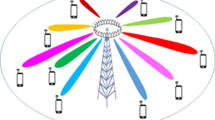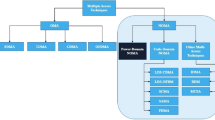Abstract
In this paper, the capacity maximization and the spectrum utilization efficiency improvement are investigated for the Pico cells in broadband heterogeneous networks. In frequency-reuse model, the users attached to Macro base station are usually viewed as primary users, and those attached to Pico base station should be regarded as cognitive radio (CR) users. As both the primary users and the CR users communicate in parallel frequency bands, the performance of the system is limited by the mutual inter-carrier interference (ICI). In order to control ICI and maximize the achievable transmission rate of the CR users, an effective power allocation scheme is proposed to maximize the transmission rate of the CR users under a given interference threshold prescribed by the primary users. By transforming this suboptimal solution into an innovative matrix expression, the algorithm is easier to perform in practice. The simulation results demonstrate that the proposed algorithm provides a large performance gain in Pico cell capacity over the non-cooperative and equal power allocation schemes.
Similar content being viewed by others
References
Haykin S. Cognitive radio: Brain-empowered wireless communications. IEEE J Sel Areas Commun, 2005, 23: 201–220
Liang Y C, Chen K C, Li G Y, et al. Cognitive radio networking and communications: an overview. IEEE Trans Veh Technol, 2011, 60: 3386–3407
Weiss T A, Jondral F K. Spectrum pooling: an innovative strategy for the enhancement of spectrum efficiency. IEEE Commun Mag, 2004, 42: S8–14
Weiss T, Hillenbrand J, Krohn A, et al. Mutual interference in OFDM-based spectrum pooling systems. In: IEEE Conference on Vehicular Technology, Milan, 2004. Vol. 4: 1873–1877
Keller T, Hanzo L. Adaptive multicarrier modulation: a convenient framework for time-frequency processing in wireless communications. Proc IEEE, 2000, 88: 611–640
Tian L, Zhou Y, Zhang Y, et al. Resource allocation for multicast services in distributed antenna system with QoS guarantees. IET Commun, 2012, 6: 264–271
Wang R, Lau V K N, Lv L, et al. Joint cross-layer scheduling and spectrum sensing for OFDMA cognitive radio systems. IEEE Trans Wirel Commun, 2009, 8: 2410–2416
Zhang Y H, Leung C. Resource allocation for non-real-time services in ofdm-based cognitive radio systems. IEEE Lett Commun, 2009, 13: 16–18
Choi KW, Hossain E, Kim D I. Downlink subchannel and power allocation in multi-cell ofdma cognitive radio networks. IEEE Trans Wirel Commun, 2011, 10: 2259–2271
Choi K W, Hossain E, Kim D I. Downlink subchannel and power allocation in multi-cell OFDMA cognitive radio networks. IEEE Trans Wirel Commun, 2011, 10: 2259–2271
Yao M, Kim D I, Wu Z. Optimization of OFDMA-based cellular cognitive radio networks. IEEE TransWirel Commun, 2010, 58: 2265–2276
Ma Y, Kim D I, Wu Z. Optimization of ofdma-based cellular cognitive radio networks. IEEE Trans Commun, 2010, 58: 2265–2276
Wan L, Wu H, Yu Y H, et al. Heterogeneous network in LTE-advanced system. In: IEEE International Conference on Communication Systems, Singapore, 2010. 156–160
Cheng S M, Lien S Y, Chu F S, et al. On exploiting cognitive radio to mitigate interference in macro/femto heterogeneous networks. IEEE Wirel Commun, 2011, 18: 40–47
Wang S W, Zhou Z H, Ge M Y, et al. Resource allocation for heterogeneous multiuser OFDM-based cognitive radio networks with imperfect spectrum sensing. In: Proceedings of IEEE INFOCOM, Orlando, 2012. 2264–2272
Kaniezhil R, Chandrasekar C, Rekha S N. Dynamic spectrum sharing for heterogeneous wireless network via cognitive radio. In: International Conference on Pattern Recognition, Informatics and Medical Engineering (PRIME), Salem, 2012. 156–162
Bansal G, Hossain M J, Bhargava V K. Adaptive power loading for OFDM-based cognitive radio systems. In: IEEE International Conference on Communications, Glasgow, 2007. 5137–5142
3GPP. Further advancements for E-UTRA physical layer aspects. 3GPP TR 36.814. v9.0.0. 2010
Author information
Authors and Affiliations
Corresponding author
Rights and permissions
About this article
Cite this article
Fei, Z., Xing, C., Li, N. et al. Power allocation for OFDM-based cognitive heterogeneous networks. Sci. China Inf. Sci. 56, 1–10 (2013). https://doi.org/10.1007/s11432-013-4807-8
Received:
Accepted:
Published:
Issue Date:
DOI: https://doi.org/10.1007/s11432-013-4807-8




